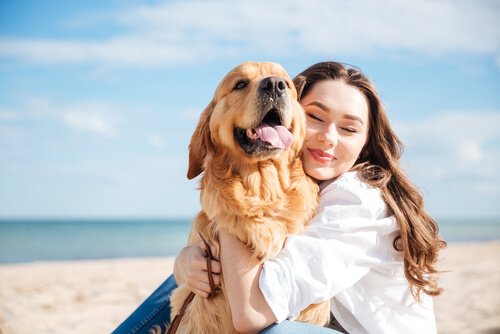Do You Have a Connection With Your Dog?

The bond created between a dog and its owner is very special. Different studies define the physical and psychological benefits of having a pet. There are many stories of reunions to prove the affection of pets towards their owners and their great connection.
This mutual affection between animals and humans can even be so strong that it influences the heartbeats of both parties. Therefore, pets help reduce stress and anxiety levels in their owners. People who have dogs are less likely to suffer from heart conditions.
Mutual Benefits of the Owner-Dog Connection

There have also been many studies that have shown our pet is able to identify when we are sad or sick. Moreover, it will adopt a position of help to improve our mood.
Among the benefits, it is shown that humans tend to be much more interested in their own food habits when they have the responsibility of feeding and caring for a pet.
Statistics about dogs and their owners have shown that many people who live alone are perfectly happy with a companion animal. Having a dog, without a shadow of a doubt, provides the individual with so much satisfaction.
A Dog and an Owner: The Link Between Dogs and Humans
The link between dogs and humans is based on: trust. The animal needs to gain confidence in its owner or master. As is the case with humans, trust is hard to come by. But it can also be easily lost.
A bond with a dog can be physical and emotional. The physical side consists with the dog seeing the owner as a supplier of his or her physical needs. These are: eating, drinking, being comfortable and warm, etc.
The emotional side is a little more complicated, and can be achieved through playtime. Games between a dog and its owner also teach obedience, and allows us to teach our dogs new things.
Petting Your Dog Reinforces Your Bond
An important trick to reinforce the bond between a dog and its owner is by petting him or her. If for example, you pet your dog while you are on the computer or watching television, the animal will notice the lack of attention towards him or her. The dog needs your full attention while you pet him or her.
Another important guideline is to call your dog and start the interaction by petting him or her. Calling your dog by its name while petting, reinforces your bond with your dog.
The Connection Between Humans and Dogs
Recent experiments have been carried out by scientists from the Department of Animal Science and Biotechnology at Azabu University (Japan).
These studies have shown that the hormone—oxytocin, creates a connection as strong as the one formed at a biological level between parents and children.
The visual contact established between the dog and its owner strengthens their emotional ties. The conclusions of the study are clear: humans and dogs reinforce their biological links in a neuronal circuit driven by oxytocin. It works and is built the same way as it is between individuals of the same family.
A Vital Importance

Dogs are social animals, and the relationship a dog has with its owner is one of the most important issues in his or her life. In this way, a good relationship with our dog begins the moment he or she enters our house for the first time. If you picked up your dog at an adoption center, the intensity of the relationship can begin from that moment.
That special bond between man and his best friend, lies in a hormonal process, activated when they look at each other. It is a bit like the bond between a mother and her child.
Oxytocin can also act as a neurotransmitter in the brain. It is considered that it has an important role in the recognition and establishment of social bonds. And in the same way, in the formation of trusting relationships between people and their pets.
